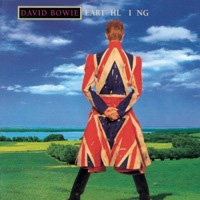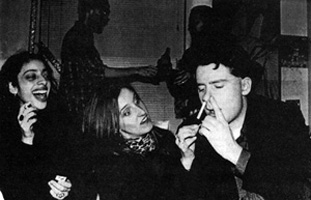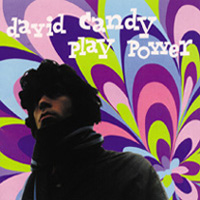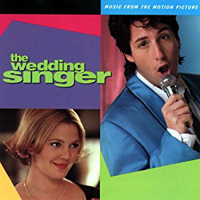 David Bowie
David Bowie
Earthling (Virgin)
by Lex Marburger
Whew. He finally caught up. After years of fearing that David Bowie would be stuck in the breakdown lane on the musical expressway (I betcha thought I was gonna use some other “superhighway” reference, huh?), he gives us not one, but two decent albums. Outside was, for all intents and purposes, an elaborate psychodrama that only appealed to the few who bothered to listen to it more than a dozen times (in a row, mind you). I was one of those, and I have to say that it becomes quite an impressive monument to the traditional “concept album” format, although it wasn’t much of a critical success (what do music critics know anyway?). Not too much innovation there, actually. Once you scraped off some of the fancier effects and Eno’s talent for making strange sounds stranger, it was very reminiscent of what he was doing in the ’70s. Not true with Earthling, though.
Jumping firmly into the saddle of modern electronica, Bowie grabbed the reins and turned the bleeping beast of techno to traverse his fertile fields of creativity. Of course, it wouldn’t really be Bowie without his heavy borrowings from other musicians (there’s quite a paradox for you- Bowie’s “originality” is usually based on someone else’s ideas). It all starts with the initial Drum ‘n’ Bass/”Firestarter” inspired “Little Wonder,” but just as he steals (ahem… “derives inspiration from”) others’ music, he always adds his own unique elements, case in point Reeves Gabrels’ hyperactive guitar squeals, Mike Garson’s ultra-clean piano sound (more about him later), and, of course, Bowie’s own sense of melody. He just can’t escape from his rock past, and the bridge becomes an anthemic arena rock lighter-waving… thing, which quickly leaps back into the Jungle pond.
And speaking of rock, the next track, “Looking For Satellites,” has a deep bass groove, thanks to eight-ball (well, I can’t say cue-ball) Gail Ann Dorsey, who counterpoints beautifully with Gabrels as he approaches the threshold of hearing with his feedback melodies. Dropping in a few seemingly Outside-inspired lines, Bowie adds a typically creepy element into the music, while drummer Zachary Alford lays it down heavy and even, matching the electronic sounds in perfect tempo.
Programming again is a key part in “Battle For Britain (the letter),” one of the key tracks on Earthling. Heavy Jungle rhythms, strong power chords, Bowie sounding whiny and prophetic, and brilliant keyboard additions from Garson (I told you I’d get back to him) fill out this song and make it unforgettable. He (Garson) completely fractures the symmetry of the song with his Cecil Taylor impersonations, so arrhythmically that the Jungle beats have to race to catch up. Garson’s done some amazing work for Bowie before, but he truly stands out on this album. Between him and Reeves, they’re a shoo-in for the coveted “weirdest sounds incorporated into a commercial album” award (Soul Coughing and Tom Waits run a close second and third).
“Seven Years in Tibet” has a drumbeat taken straight from NIN’s “Closer,” but Trent stole that from Iggy Pop’s “Nightclubbing” (which Bowie produced and co-wrote), so who’s stealing from who here? Another anthemic chorus, industrialized with better guitar crunch than most of the rivetheads out there. Are you paying attention, guys? This old man is kicking your ass. I ran into problems around this song, ’cause I wanted to know what Bowie is saying, and the CD doesn’t come with lyric sheets. I can pick out a few lines, “You’ve been shot in the head,” “I praise to you, nothing ever goes away,” but I wish I knew what he was talking about.
Earthling seems to mix up the rock and techno pretty well, as “Dead Man Walking” launches back into the dance-floor beats and high-pitched keyboard riffs floating above his vocals, while subterranean bass keeps it all firmly grounded with the drums. It’s the most direct of the album’s tunes, grabbing and shaking you until convulsions set in and you have to get up and dance around. “Dead Man Walking” shows that Bowie can mix his traditional rock sensibilities with futuristic electro music (the harmonic-screaming guitar solo that starts with a sound like an answering machine is a nice touch), and its ending, with Garson, alone, laying down huge runs on the piano, is fantastic.
Such merging is also wonderfully shown in “Telling Lies,” which has the hyperkinetic drumtracks underneath a half-tempo melody, with a chorus containing the words “Blue eyed visionary” (or is it “blue pop visionary?” I can’t tell). It’s obvious that Bowie isn’t selling out to the next big wave of pop music. He and Reznor (“The Perfect Drug” could easily fit into the Earthling context) have incorporated a unique sound into their work, they’ve opened themselves up to new sounds and ideas, the only way a songwriter can keep from stagnating (Cf. the Beastie Boys’ fantastic surge and ebb of amazing albums).
By the time you get to “The Last Thing You Should Do,” you realize the songs are gradually becoming much more of a blending of rock and Jungle. Rather than the first tunes which are primarily one or the other, the seamless blending of the two styles becomes more apparent as the album goes along, and it becomes difficult to say “okay, the guitar is rock, while the bassline is more Drum ‘n’ Bass, while the keyboards…” etc.
It’s surprising that the one tune Eno helped write, “I’m Afraid of Americans,” rocks out as much as it does, considering his present leanings toward the ambient (the last thing that really rocked out was ’92s Nerve Net, and although the Passengers CD had some hard tunes on it, I figure that’s U2’s doing). The odd beeping over the top seems to be Eno’s work, but all the strange percussion sounds (it’s that Industrial thing again), or the foot-stomping rock chords must have come straight out of Bowie’s head. This also sounds like an Outside outtake, with more anger and less lonely wandering.
A sampled, fascistic voice saying, “I don’t want knowledge, I want certainty,” begins “Law (Earthlings on Fire)” and it doesn’t stop there. Bowie goes slightly atonal on his vocals, displacing the steady beat from its comfortable home in AC/DC-land, and when Dorsey plays the Kraftwerk bassline below Garson’s disjointed keyboards and Reeve’s Rodan-Attacks-Japan guitar, all hell breaks loose. You can almost hear the spaceships landing and blowing the hell out of the Pentagon. Bowie has once again reclaimed the throne of the Beautiful Futurist.
And then it’s over. When the music finally fades out, and you’re left in your room, basking in the silence, you can finally give thanks to whomever’s listening that Bowie’s name no longer means an instant reference to “Let’s Dance,” or that terrible late ’80s album Black Tie/White Noise.



